Breeding
From Grouse House Wiki
| Table of Contents |
|---|
| Links not working? Sections must be expanded to jump to a subheader within them! |
| The Basics |
| Breeding Males |
| Heats |
| Studding |
| Fertility |
| Genetics, Stats, and Personality |
| Nesting and Pregnancy |
| Making Nests and Nesting Wolves |
| Scrying Stone |
| Wolf Birth Information |
| Survival Chance at Birth |
| Runts and Largest Puppies |
| Identical Twins |
| Pair Bonds |
| COI, Inbreeding, and Generation |
| Breeding Items |
| Achievements |
Breeding is one of the primary mechanics that Wolvden is based around. With such an elaborate genetics system, breeding is a great way to get new traits into your pack, explore possibilities, and grow your family!
Breeding is locked until you complete the unique quest The Next Generation, which has you temporarily assign a breeding male and insta-birth a litter to learn the basics. This quest is available on your first day, after you complete the Time to Hunt quest. After this, you can assign your own breeding male, send stud requests, and have puppies!
The Basics
The Basics
Wolves can be bred after they turn one year old, or 24 rollovers old. It's not as simple as pairing two wolves together, however. While any female wolf can be bred if you choose, only select male wolves have the same possibility. You must pair a designated breeding male with your female wolf, or make a pair bond between the wolves in order to be able to breed them together! In addition, female wolves can only breed during certain times, called their heat cycle.
Breeding within your own pack can be done from the Breeding page. Breeding two wolves will expend 2% energy from each of them for each pregnancy attempt. A wolf requires at least 2% energy, 50% hunger, 80% mood, and 1 HP to breed. Additionally, illness may affect breeding- some illnesses prevent a wolf from breeding altogether while other illnesses may have the chance to be transmitted via breeding.
The litter size and attributes of the pups are determined at conception, right when the wolves are bred. This means that changing one of the parents' appearances or stats after they have already been bred will have no affect on the puppies. This is also true of personalities- puppies have a 90% chance to get a personality from one of their parents' personality group(s) and a 10% chance for a completely random personality.
Wolves can give birth to 1 to 6 pups per litter, unless the litter has an identical twin, in which case a 6-pup litter could become a 7-pup litter!
Breeding Males
Breeding Males
Breeding Males are the primary method of breeding that new players are introduced to. While you can breed any wolves in your pack using Pair Bonds, only Breeding Males can become studs and breed outside the pack.
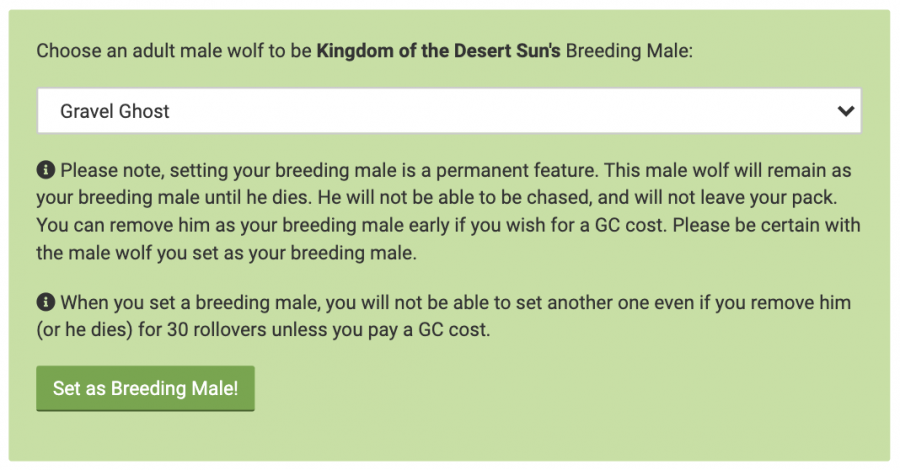
After the tutorial quest, you're able to pick a new breeding male on your den's Breeding page. Breeding Males are intended to be a permanent role, and they cannot be removed without a costly fee. As such, it's recommended that users do not assign their breeding male until they obtain a wolf that they would be happy to breed with for multiple months. Any adult male can be made your breeding male and they will remain your breeding male until their death, or until you remove them from the role for a GC cost. You cannot select pups or adolescents to become your breeding male.
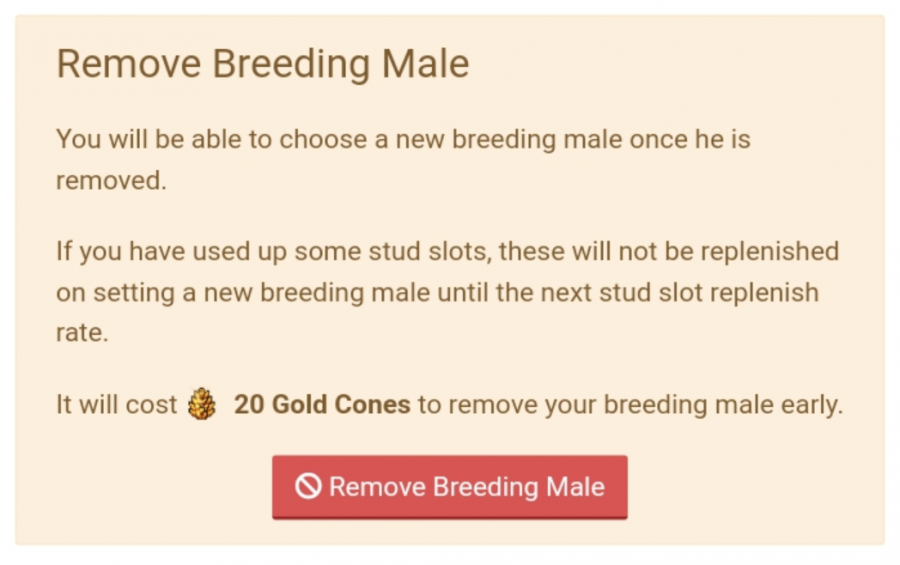
Removing a breeding male from his position early can be done on the Breeding Male Settings page. It has a base cost of 20 Gold Cones. If you have assigned this breeding male within the past 30 rollovers, an additional 25
GC cost will be added, for a total of 45 GC. Even after the 30-day cooldown is over, you still have to pay 20 GC to remove your breeding male early. This can never be done for free.
If you want to remove your breeding male from their position without killing/retiring them, you must do this from the Breeding Male Settings page. Do not use the "Retire" option on the wolf page, as this will send the wolf to your dynasty and you will be unable to revive them. If you "Remove" the breeding male from their role on the Breeding Male Settings page, they will not be killed and will instead become a normal pack member.
Heats
Heats
Female wolves must be in heat in order to breed. You can tell that a female is in heat if they have a heat icon next to their name and a note in the Breeding Information section of their page. Hovering over the heat icon will tell you how many rollovers the wolf has left of their heat. Heats last for 4 rollovers and count down from 4. So, even if the icon says that the wolf has one rollover of heat left, they won't actually be in heat after their next rollover.
A new adult wolf, either befriended or customized, will go into heat 8 rollovers after they join the pack. There is not currently a way to befriend wolves who are already in heat. Wolves aging into adulthood will go into heat immediately at 1 year old unless they were aged up using an Aging Crystal or adopted from the Enclave, in which case their heat may be delayed a few rollovers. If a female wolf isn't bred during their heat, they will go back into heat 8 days later. Male wolves follow this same cycle, but hidden from view. The cycle will be evident if you were to sex change the male wolf, as they would go into heat if the amount of days since they reached adulthood lined up with what would be needed for a female wolf of the same age to go into heat.
Female wolves that are elders, 7 years 2.5 months and older, are unable to breed, so they will no longer have heats. Instead, the heat cycle indicator on their page will say N/A.
Don't want to wait through a whole heat cycle? You can instantly push a female wolf into heat using an Elk Heart, purchased from the Grove, but only if the female wolf is not pregnant, nursing, or on a breeding cooldown.
| Heat Cycle Durations | |||
|---|---|---|---|
| Wolves bred on their heat | Wolves not bred on their heat | ||
| Heat | 4 rollovers | Heat | 4 rollovers |
| Pregnancy | 4 rollovers | Default | 8 rollovers |
| Nursing | 5 rollovers | Heat | 4 rollovers |
| Cooldown | 15 rollovers | Default | 8 rollovers |
| Heat | 4 rollovers | Heat | 4 rollovers |
| Grouse Tip! | |
| A variety of different Heat Calculators are available here, which you can use to check when a wolf's next heat will be or how many heats they have left in their lifetime! | |
Studding
Studding
Interested in making some money from your breeding male? You can put your breeding male up for public stud on the breeding settings page. This will allow other players to send breeding requests to your male for currency. If you want some fresh blood for your own pack, you can breed to other players' public studs, as well!
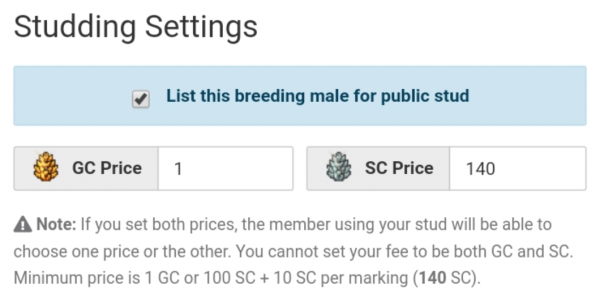
Once set as a public stud, your breeding male will start the week with 15 stud slots. Every stud request you get will take one stud slot. If you drop to 0 stud slots, you can pay to refresh the slots, but you can only buy an additional 15 every week for a total of 30 possible slots every week. Each additional stud slot purchased costs 2 Gold Cones. Stud slots refresh on Mondays at 00:00.
To find other players' studs to breed your own wolves to, you can search the wolf search page page by checking the For Stud option and narrowing down your desired stud price, browse the Studs forum board, or check out the Sales chat. There's hundreds of studs to choose from, each with their own unique traits, and plenty of people advertise theirs in the hopes that someone will choose them! After you have found a stud to breed to, visit their page, where you can find a Breed to this Breeding Male option. From there, select your in-heat female from the dropdown menu.

Before sending a stud request, make sure that you have read the player's Stud Rules if they have any. Oftentimes, specific rules are laid out that might mean your request will be denied if you don't abide by them. For example, many players disallow "Stud Racing", referring to trying to breed your own wolf while a stud request is out. Be patient for the player to accept your stud request, rather than rushing to breed your wolf yourself.
Next, you can select the method of payment you prefer. This could be Silver Cones or
Gold Cones, but you cannot send a combination of these currencies. You have the option to send a message to the stud owner if you would like. Finally, you can choose breeding items to send alongside the request which will be automatically applied to the stud when they breed to your wolf.
The currency that you paid for the stud request will disappear from your account after the request is sent. If the request is rejected, the currency will be returned to you. The stud owner can breed your female as many times as is needed to get them pregnant, but you will only have to pay the singular fee. After your female is pregnant, you will receive a notification that the breeding was successful. If the stud owner rejects your request, you will also receive a notification informing you of this.
If your female is sick with an [Illnesses|illness that affects breeding], or doesn't have enough energy, HP, hunger, and mood, the stud owner will not be able to breed them. After sending the stud request, you will not be notified if the female is unable to breed. So, if you have an outgoing stud request, make sure to keep the female happy and healthy!
You can view all of your current outgoing stud request on your Breeding page, under the Outgoing Stud Requests tab. This is also where you can remove stud requests if you've changed your mind.
Fertility
Fertility
Fertility is a value that female wolves have that determines how easy they become pregnant, specifically how many tries it might take to successfully breed them. The lower the fertility value, the harder the wolf is to breed. You can view your female wolf's fertility category on their page, but the exact percentage isn't visible until you reveal the wolf's fertility on the Fertility Snake page. This costs 20 Silver Cones per wolf. A wolf's fertility is determined when they are conceived and is fixed. Sex-changing a wolf multiple times will not alter their fertility.
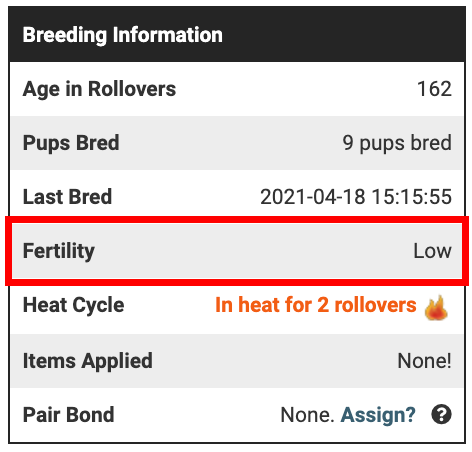
According to the breeding tutorial quest, wolves with low fertilities may have a higher chance of birthing a random mutation (but not a genetic one)! Fertility does not affect how many pups a wolf tends to have in one litter, this is purely random. Each fertility falls into a specific category, which serves as a descriptive hint if you do not have the exact fertility percentage revealed.
| Fertility Thresholds | |
|---|---|
| Infertile | 0% |
| Extremely Low | 1% |
| Very Low | 2 - 10% |
| Low | 11 - 30% |
| Average | 31 - 50% |
| Good | 51 - 70% |
| Very Good | 71 - 90% |
| High | 91 - 99% |
| Extremely High | 100% |
You can temporarily increase or decrease your wolf's fertility using Juniper Berries or Pasque Flowers, purchased from the Fertility Snake. The fertility adjustment only applies until the wolf's next successful breeding.
Genetics, Stats, and Personality
Genetics, Stats, and Personality
The important, determining factor in what your wolf's pup look like is their genetics! Visual traits aren't the only thing based down in breeding though- stats and personality are also affected by a pup's parents.
Wolvden's genetics system is very intricate. There's a lot of layers to a wolf's appearance and even hidden genetic traits. You can learn all about genetics generally on the Genetics and Appearance page. To get into specifics, check out the Base Genetics, Marking Genetics, Eye Genetics, Skin, Nose, and Claw Genetics, and Mutations pages. Pups won't always get their parents' exact traits. Base breeding will produce a random base from a specific group, there's chances that markings won't pass, eye colors might fail, and more. While a wolf's pups might look similar to them, you'll find a pleasant amount of variety in every litter!
The amount of stats that a pup has will be determined by the stat totals of their parents. You can learn more about stats on the Stats page! Generally speaking, a pup will get roughly 1/3 the combined total of their parents' stats. However, there is some variance to this and the amount that the pup gets lessens as stat total rises.
A pup's personality will also be affected by the parents' personalities. This time, the pass rates are much more simple! Puppies have a 90% chance to get a personality from one of their parents' personality group(s) and a 10% chance for a completely random personality.
Nesting and Pregnancy
Nesting and Pregnancy
Pregnancy takes a toll on a wolf's body and has a few noticeable effects! Pregnant wolves will regain energy at a slower speed than normal. Pregnant lead wolves will regain 8% energy every 7.5 minutes as opposed to the normal 10%, while pack members will only get 3% energy every 7.5 minutes as opposed to the normal 5%. Pregnant wolves will also lose 30% hunger every rollover instead of the normal 20%. Once they have given birth, these effects will wear off.
Pregnant wolves will have icons next to their names that change depending on how far along in the pregnancy they are. Hovering over the pregnancy icon will display how many rollovers this wolf has left of the pregnancy.
Making Nests and Nesting Wolves
Making Nests and Nesting Wolves
Once pregnant, wolves must be nested in order to safely give birth or else they will risk losing some pups when they are born. In order to safely nest a wolf, they must be given a Nesting Material from the Nesting page. Only one Nesting Material is required to safely nest a wolf. If a wolf is not nested the day before they are due to give birth, you will receive a notification in your Daily Rollover Summary reminding you to nest them. Be sure to nest them before rollover- if they give birth without a nest, there's a chance that they some pups will not survive the birth!

Icons will be visible on your Den page for pregnant wolves who are not nested on their last day of pregnancy, as well as for pregnant wolves are are nested. The unnested icon only shows up if you do not have Auto-Nesting. You will also get a notice in your Daily Rollover Summary if you have any pregnant wolves who are on their last day of pregnancy and not yet nested, assuming you don't have Auto-Nesting.
If you do not nest a pregnant wolf, there is a chance that some of their pups will not survive the birth. While a small chance remains that every pup will survive by luck, in order to ensure survival, nesting your pregnant wolf is important. The amount of pups that would be lost in an unnested litter, if any at all, is predetermined by litter size.
| Litter Size | Pups Lost |
|---|---|
| 1 | 1 pup |
| 2 | 1 pup |
| 3 | 1 pup |
| 4 | 2 pups |
| 5 | 2 pups |
| 6 | 3 pups |
Nesting Material can be obtained through a variety of means. There are multiple explore encounters that can drop Nesting Materials, and they can also be purchased from Raccoon Wares for 60 Silver Cones. If you find yourself with a lot of spare items, you can also craft Nesting Material from the Crafting page. 10 soft items, such as feathers, herbs (with the exception of Charcoal), leaves, and pelts, can be combined into one Nesting Material. Nesting Materials require remnants over whole items. If you are trying to use an item that can be shredded, you must shred it first before using it in crafting.
Once a wolf is nested, they will become unable to complete role tasks until they give birth. Wolves cannot be nested while they are actively completing a task, either. Hunters will not be able to join hunts, scouts will not be able to scout, etc. Nested lead wolves will still be able to explore and battle.
When a wolf is nesting, their pose will be replaced with special nesting artwork! This artwork change lasts while the wolf is nested and while they are nursing pups. They will be reverted to their previous pose once their pups are weaned. If you enjoy the way the pose looks, however, you can also purchase it in the form of the Pose Variant [Motherly] for 3 Gold Cones from the Grove!
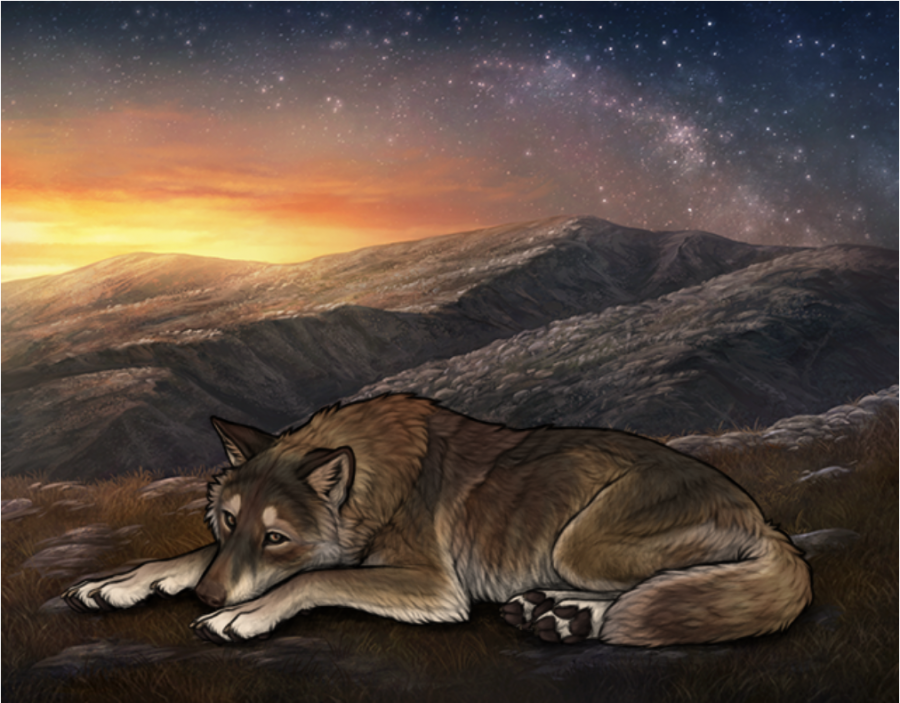
Auto-Nesting
If you find yourself forgetting to nest wolves frequently, the Auto-Nesting service might be a good choice for you. This is a paid service you can purchase in subscription form from the Grove, meaning you have to renew the subscription every month or few months to keep being able to use the service. You will get a notice in your Daily Rollover Summary when your subscription is about to expire.
Auto-Nesting will automatically nest your wolves during the rollover that they give birth. With Auto-Nesting, wolves can be nested even while they are completing tasks, unlike with normal nesting. This means that you can send your wolves out to complete their tasks and then log off for the night, and rest assured that your pregnant wolves will be properly nested when you check in on them after rollover.
Auto-nesting still requires that you have a Nesting Material in your Hoard. If you do not have any Nesting Materials in your hoard on the rollover that one of your wolves gives birth, they will not be nested by auto-nesting. As long as you have a good stock of Nesting Materials, your pregnant wolves will never suffer complications with birth while Auto-Nesting is enabled.
Scrying Stone
Scrying Stone
The Scrying Stone is accessible from the Crossroads. This page can provide information about current pregnancies and potential offspring.
For 10 Silver Cones, you can select a male and a female wolf to scry together. This will return 4 potential puppies that the female wolf could have if these wolves are bred together. The puppies you are shown are only a possibility and there is no guarantee that the puppies from this breeding will look like this. The scrying stone will not display mutations, either random or genetic, so it cannot be used to determine if your wolf is a carrier of a mutation. You can scry any wolves together regardless of age, but you cannot scry two wolves of the same sex together.
For another 10 SC, you can get an ultrasound of one of your female wolves. This will tell you exactly how many puppies that wolf is carrying. The wolf is guaranteed to give birth to this many puppies as long as they are properly nested before the rollover of the birth.
Wolf Birth Information
Wolf Birth Information
On a wolf's page, you can view information from when they were born! This includes their starting stats as well as birth location and time. This information is recorded when they were born, not when they were conceived, and is purely for informational purposes. Moon phase, season, and biome born in do not currently have any gameplay effect- they're just for fun!
Survival Chance at Birth
Survival Chance at Birth
Upon birth, puppies in a litter will have a predetermined survival chance influenced by a number of factors. A pup's survival chance is a value that reflects the percent chance that pup has to survive a rollover- 50% survival chance, for example, means there is a 50% chance the pup will survive and a 50% chance the pup will die. You can get an idea of what a pup's survival chance at birth might be by considering these factors before they are born. Nesting a wolf does not affect the pups' survival chance after birth, but does guarantee that all pups will survive the birth at all.
A pup's survival chance at birth begins with a base value that is determined by the litter size. Each pup in the litter, excluding runts or largest pups, will start at this base value before additional modifiers are applied. Having twins in a litter will not affect the survival chance- twins will simply be calculated as one wolf with the same survival percentage.
| Litter Size | Base Survival Chance |
|---|---|
| 1 | 60% |
| 2 | 55% |
| 3 | 50% |
| 4 | 50% |
| 5 | 45% |
| 6 | 40% |
| 7 | 40% |
Following this base value, modifiers will be applied to each pup's survival chance depending on the season, your lead wolf's personality, each parent's level, lead wolf talents, and whether or not the pup is a runt or largest puppy. Four lead wolf personalities affect pup survival chance for each season, and one lead wolf talent provides a pup survival chance bonus. The tables below detail each additional modifier, which can stack on top of each other to each affect a pup's survival chance at the same time.
| Season | Modifier |
|---|---|
| Spring | +10% |
| Summer | +0% |
| Autumn | +0% |
| Winter | -10% |
| Lead Wolf Personality | Restriction | Modifier |
|---|---|---|
| Humble | Spring Only | +5% |
| Confident | Summer Only | +5% |
| Sullen | Autumn Only | +5% |
| Sarcastic | Winter Only | +5% |
| Parent Level Modifiers | ||
|---|---|---|
| The survival chance modifier based on a pups parents' levels is calculated as the parents' average level rounded down. If the father dies or is chased before the pups are born, his level is calculated as 0. Examples are available below. | ||
| Mother's Level | Father's Level | Modifier |
| 1 | 1 | +1% |
| 5 | 10 | +7% |
| 20 | 20 | +20% |
| Talent | Modifier |
|---|---|
| Den Parent | +5% |
| Status | Modifier |
|---|---|
| Runt | -10% |
| Largest Pup | +5% |
That's a lot of modifiers! To help give an idea of how they all might affect a litter, we've provided an example below.
Two level 5 wolves are bred together, and the litter will have 4 puppies. The litter will be born in Winter, and the lead wolf has the Sarcastic personality and Den Parent talent applied. Upon birth, it's revealed that the litter also has a runt and a largest pup. The runt of the litter will be born with 45% survival chance (50% base, -10% seasonal modifier, +15% personality, talent, and level modifiers, -10% runt modifier). The largest pup will be born with 60% survival chance (50% base, -10% seasonal modifier, +15% personality, talent, and level modifiers, +5% largest pup modifier). The other two pups in the litter will be born with 55% survival chance (50% base, -10% seasonal modifier, +15% personality, talent, and level modifiers).
Runts and Largest Puppies
Runts and Largest Puppies
Depending on litter size, with larger litters having a higher probability, there is the chance of runts and largest pups being born. Upon birth, these pups will be named either "New Largest Puppy" or "New Runt Puppy". Both pups will receive a badge by their sex indicating their status.
 | 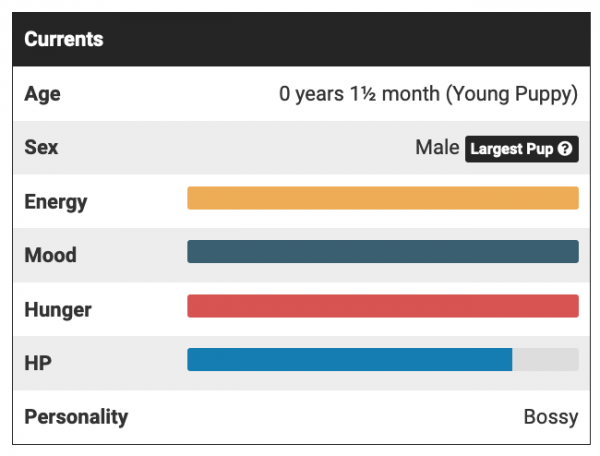 |
The largest puppy is usually the puppy with the highest stats and will be given a survival chance boost. The runt puppy will be the opposite, being the one with the lowest stats and given a survival chance penalty. Both largest puppies and runts will gain additional stats and survival chance just the same as any other wolf and their status will not affect them as they age.
| Chance of a runt and largest pup appearing in a litter | |
|---|---|
| 1-2 pup litter | 0% chance |
| 3 pup litter | 10% chance |
| 4 pup litter | 20% chance |
| 5 pup litter | 30% chance |
| 6 pup litter | 40% chance |
Identical Twins
Identical Twins
In a rare, random occasion, your wolf might give birth to identical twins! Every litter has a chance of producing identical twins. When this happens, one extra pup is added to the litter, which means that a wolf could give birth to 7 pups if the 6th pup in their litter has a twin. If you have an identical pup born in a litter, it will say as such in the birth notification you receive.
Identical twins are completely identical, from appearance, to stats and personality. They'll have the same mutations and carrier status, as well. If a pup is an identical twin, they will have a badge next to their sex indicating as such, and their twin will be linked under their birth information.
Pair Bonds
Pair Bonds
Pair Bonds are a method of breeding which can allow a non-breeding male to have pups! However, the male wolf can only breed with the female in his pair. Pair bonding is unlocked on your 30th rollover, on which the accompanying quest becomes available to you from the Questing page! Adult wolves can form pair bonds after they have been in your pack for at least 7 rollovers.
You can view all of your current pair bonds on the Pair Lists page, where you can also disband the pair or breed them if both wolves are eligible. There is no limit to the amount of pair bonds you can have in your pack.
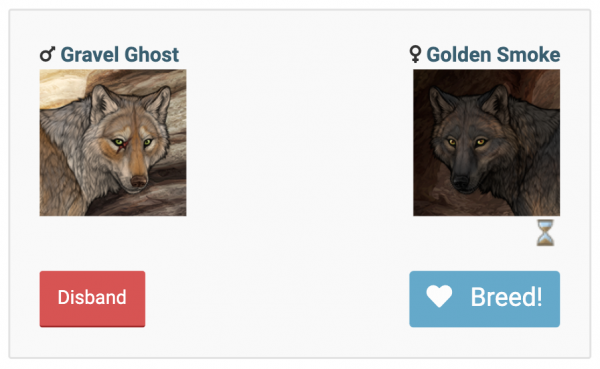
Pair bonds consist of two wolves and can be formed regardless of the wolf's sex. Different-sex pair bonds are able to breed when the female wolf is in heat. Same-sex pair bonds are not able to naturally conceive puppies, but any pair bond is able to adopt puppies from the Enclave. Wolves can only be in one pair bond at a time, and you cannot trade a wolf that is in a pair bond. Breeding males can also be a pair bond, and they will still be able to breed to any female inside or outside the pack like they are able to normally. Females in pair bonds are also not required to breed to the male in their pair bond- they can breed to a breeding male or an outside stud, as well. If a male in a pair bond is not a breeding male, however, they will only be able to breed to the female in their pair bond.
You can view if a wolf is in a pair bond in the Breeding Information section of their page.
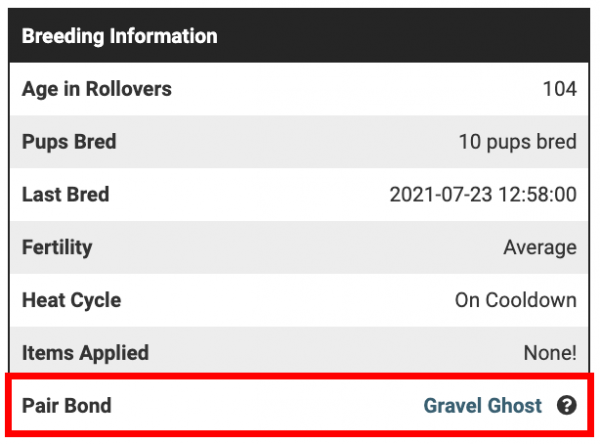
Pair bonds will last until one of the wolf's passes, or until you choose to disband the bond manually. Disbanding a pair bond does not cost anything and can be done on the Pair Lists page. However, after a pair bond is disbanded (whether through death or player choice), both wolves who were in that pair bond will loose all of their Mood. You must play with them quickly before the next rollover to prevent them from leaving your pack. Disbanding a pair bond will also put both wolves on a 30-rollover pair bond cooldown during which they cannot be added to a new pair bond. If a wolf leaves your pack due to neglect, their pair bond will be disbanded. Reclaiming them into your pack does not renew the pair bond, even if both wolves left and were reclaimed at the same time.
Having a lead wolf with the personality Amiable will reduce pair bond cooldowns by a third and half the mood loss suffered after breaking a pair bond, meaning the wolves will only lose 50% mood instead of 100%.
Pair Bond Restrictions
Pair Bond Restrictions
While there is no limit to how many pair bonds you can have, the amount of breedings you can make between pair bonds is restricted based on your territory size. This restriction is not how many pair bonds can be made, but how many breedings can be done by the pair bonds already made. Pair bond breedings are defined by breeding done through the Pair Lists page. If your breeding male is in a pair bond, but you are breeding him from the breeding male page, it will not count towards your monthly limit. Your pair bond breeding count resets on the 1st of every month.
| Pair Bond Breeding Limits | |
|---|---|
| < 10 territory: | 2 pair breedings |
| 10 territory: | 3 pair breedings |
| 20 territory: | 4 pair breedings |
| 30 territory: | 5 pair breedings |
| 40 territory: | 6 pair breedings |
| 50 territory: | 7 pair breedings |
| 60 territory: | 8 pair breedings |
| 70 territory: | 9 pair breedings |
| 80 territory: | 10 pair breedings |
| 90 territory: | 11 pair breedings |
| 100 territory: | 12 pair breedings |
| 110 territory: | 13 pair breedings |
| 120 territory: | 14 pair breedings |
| 130 territory: | 15 pair breedings |
| 140 territory: | 16 pair breedings |
| 150 territory: | 17 pair breedings |
| 160 territory: | 18 pair breedings |
| 170 territory: | 19 pair breedings |
| 180 territory: | 20 pair breedings |
| 190 territory: | 21 pair breedings |
| 200 territory: | 22 pair breedings |
COI, Inbreeding, and Generation
COI, Inbreeding, and Generation
Wolvden keeps a detailed record of your wolves' family and lineage. Any wolf bred on site will have their parentage recorded! From the wolf's Family page, you will be able to view their entire pedigree, as well as information about inbreeding. You can get to a wolf's Family page by clicking on this View Family button on the wolf's page.
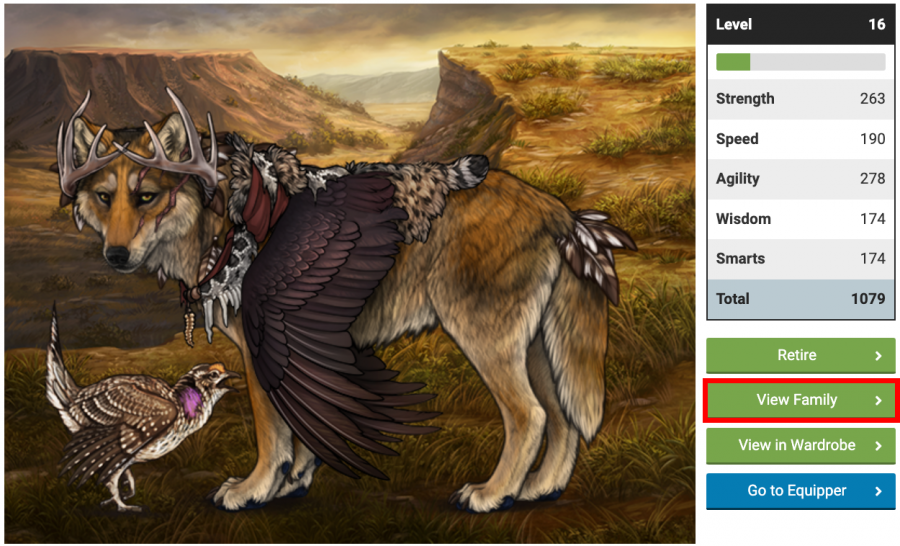
At the top of a wolf's family page, you will find three different stats determined by the wolf's heritage: Coefficient of Inbreeding (COI), Instances of Inbreeding, and Generation. Underneath these will be your wolf's family tree, going back 4 generations. If you'd like to see further back in the tree, you can click on the names of the wolves' great grandparents to view their family trees. If a wolf in this family tree has passed, they will still show up on the tree. However, if a wolf has been chased, they will display as a black silhouette.
The values presented on the Family page do not have an impact on gameplay, they are purely for player reference and market value. Inbreeding and generation do not affect a wolf in breeding nor provide any adverse effects. However, inbreeding is generally valued low by the community, and wolves with any instances of inbreeding or a COI higher than 0% will be worth less to many people than a wolf without inbreeding. Alongside this, lower generation wolves tend to worth more than higher generation wolves.
Coefficient of Inbreeding
Coefficient of Inbreeding
A wolf's coefficient of inbreeding, or COI, provides information about how related their parents are. It is calculated by comparing the father's side of the family tree against the mother's side of the family tree. If wolves that appear in the father's side of the tree also appear in the mother's tree, then a rate of COI is present for the offspring. A lower COI means that inbreeding is more distant, while a higher COI means that inbreeding is more recent.
A COI of 0% means that the mother and father are not related. However, this does not mean that the wolf is not completely inbreeding-free. If the mother is inbred, but does not share any common ancestors with the father, then the wolf's COI will still be 0%. A COI of 25% means that a pup has been bred to its parent or full sibling. A COI of 12.5% means that half-siblings have been bred, or a grandchild has been bred to a grandparent. A COI of 6.25% means that first cousins have been bred, or a great grandchild has been bred to a great grandparent. Any COI greater than 25% means that there is more than one instance of inbreeding in the family tree.
COI is only calculated on the first page of a wolf's family tree. If their parent's are related past their great grandparents, it will not be counted in the wolf's COI.
Instances of Inbreeding
Instances of Inbreeding
The instances of inbreeding value represents how much inbreeding is present in a wolf's family tree. Inbreeding in this case is defined by one wolf appearing in the pedigree more than once, whether on both parents' sides or one parent's side. For example, the wolf below is inbred because their father is also their mother's father.
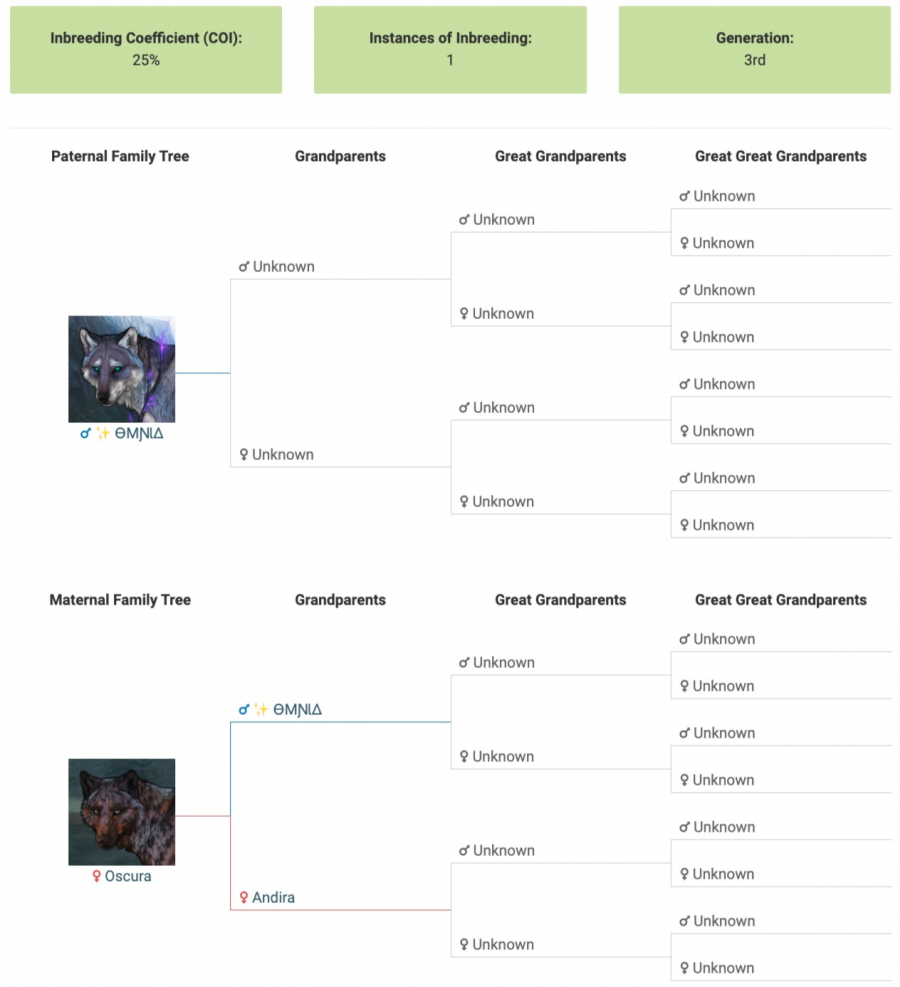
Instances of inbreeding are only calculated on the first page of the wolf's family tree. So, if a wolf's great great grandparent is also their father, they will not have any instances of inbreeding shown. Instances of inbreeding have no effect on gameplay.
Generation
Generation
A wolf's generation indicates how many generations back its pedigree goes. Any wolf is always at least 1st generation. If the wolf does not have parents listed on the family tree, it is 1st generation. 1st Generation wolves are often also referred to as "NBW" or "New Befriended Wolf", because all wolves you claim from exploring are 1st generation. Wolves created with the Customiser in the Grove are also 1st generation.
For every additional column of wolves that goes back on the family tree, you can add one generation. For example, the wolf below is fourth generation, because the further back line in their family tree stops at 3 out. With the wolf itself already being one generation, you then add 3 to this, to get 4th generation. The generation value does not stop counting after the first page of the family tree- it goes as far back as the whole pedigree goes.
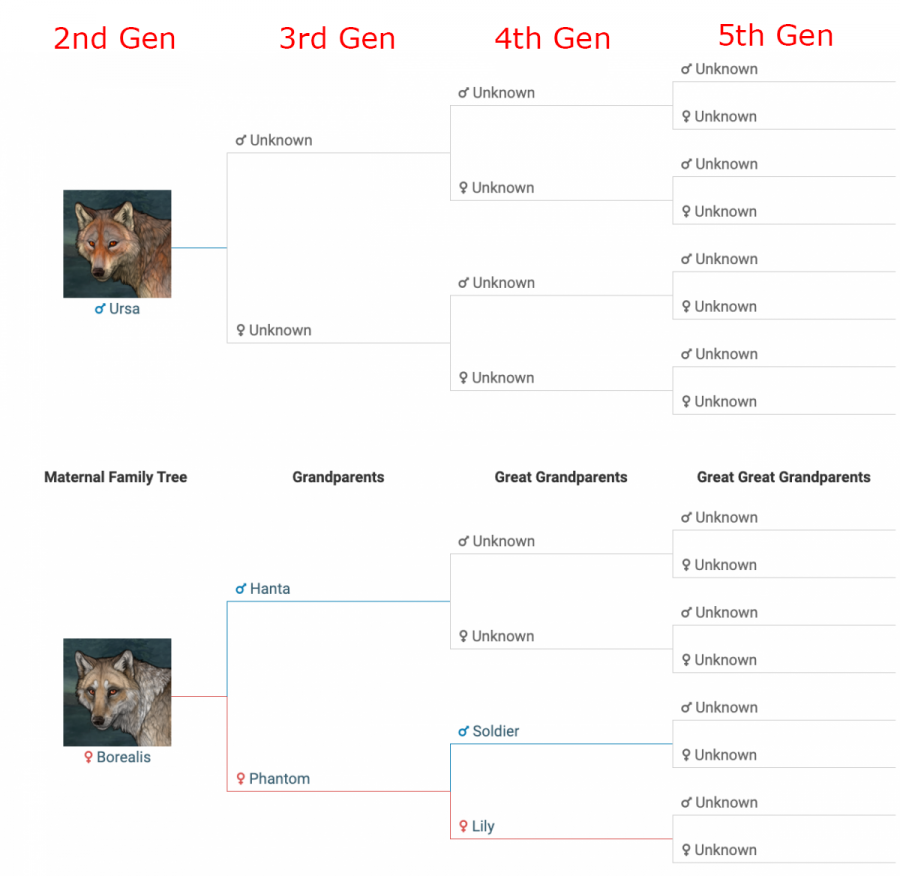
Breeding Items
Breeding Items
Breeding items are special items that can be used before a breeding to guarantee certain results in their upcoming litter, such as little size or a specific trait. Most items can be used on either one of the parents, however some can only be used on a male or a female wolf. When stacked between both parents, items of the same or similar purpose will use the female's item, while the male's item will remain for the next breeding. This is so that two items with counteracting uses will not both be used in the same breeding.
You can send breeding items alongside stud requests to be automatically applied when the stud owner accepts the request. Studs may also have their own items applied, which you can view under Stud Information on the studs' page.

You can also see what items a wolf has applied from their page, under the Breeding Information section.
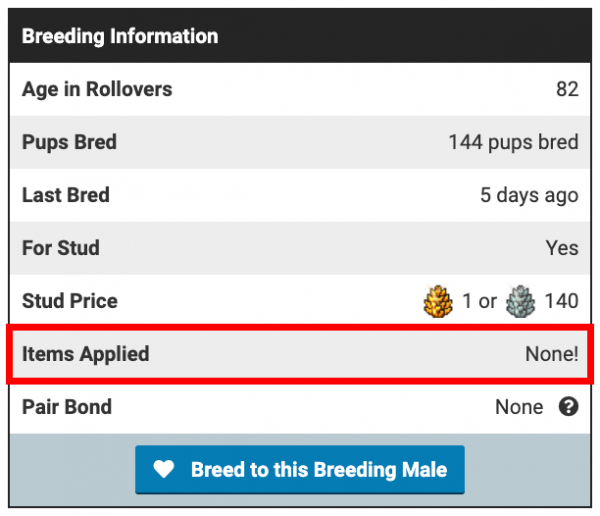
| Breeding Item | Source | Effect |
|---|---|---|
| Black Sage | Jackpot prize in Slots | Guarantees a minimum of 4 puppies in a wolf's next litter |
| Blue Sage | Jackpot prize in Slots | Guarantees a minimum of 5 puppies in a wolf's next litter |
| Flint Saltlick | Purchase from the Boutique of Delights during the February Matchmaker event | Pass a wolf's exact claw color onto all pups in their next litter |
| Great Tit | Jackpot prize in Slots | The wolf's next litter will be entirely female. Can only be fed to a breeding male |
| Juniper Berries | Purchase from the Fertility Snake | Decreases your wolf's fertility by 10% for their next breeding. Can be stacked until the wolf is at 1% fertility |
| Opal Saltlick | Purchase from the Boutique of Delights during the February Matchmaker event | Pass a wolf's exact eye color onto one random pup in their next litter |
| Pasque Flower | Purchase from the Fertility Snake | Increases your wolf's fertility by 10% for their next breeding. Can be stacked until the wolf is at 100% fertility |
| Red Cock | Jackpot prize in Slots | The wolf's next litter will be entirely male. Can only be fed to a breeding male |
| Rock Salt | Purchase from the Boutique of Delights during the February Matchmaker event | Pass a wolf's exact nose color onto all pups in their next litter |
| Sea Salt | Purchase from the Boutique of Delights during the February Matchmaker event | Pass a wolf's exact skin color onto all pups in their next litter |
| White Sage | Jackpot prize in Slots | Guarantees a minimum of 6 puppies in a wolf's next litter |
| Wolf Blood | Purchase from Mohkra during the October Halloween Spectacle event | Provides a small chance that one pup in the wolf's next litter will develop a recessive mutation even if neither parents are carriers. Can only be fed to a female wolf |
| Wolf Meat | Purchase from Mohkra during the October Halloween Spectacle event | Provides a higher chance for any pup in the wolf's next litter to develop a random spontaneous mutation. Can only be fed to a female wolf |
| Wolf Scrotum | Purchase from Mohkra during the October Halloween Spectacle event | Can be fed to a wolf with a mutation to provide a higher chance for one pup in their next litter to develop that same mutation. Can only be fed to a female wolf |
Achievements
Achievements
The Breeding category of Achievements contains a lot of breeding-related achievements for you to collect! While they don't grant prizes, it can be fun to work towards earning them all.
| A Runt?! | |
| Had a runt in the litter born. | |
| Albinism | |
| Bred your first wolf with Albinism! | |
| Big Litter | |
| Bred a little of 6 puppies. | |
| Born Ready | |
| Breed a puppy with at least 100 in each stat. | |
| Brachycephaly | |
| Bred your first wolf with Brachycephaly! | |
| Conjoined Twins | |
| Bred your first Conjoined Twins! | |
| Deafness | |
| Bred your first wolf with Deafness! | |
| Epic Dynasty | |
| Breed a 20th generation wolf. | |
| Fifteen Forefather | |
| Breed a 15th generation wolf. | |
| Five-Star Family Tree | |
| Breed a 5th generation wolf. | |
| Hereditary Cataracts | |
| Bred your first wolf with Hereditary Cataracts! | |
| Listening for News | |
| Ultrasound a pregnant wolf. | |
| Lone Puppy | |
| Had one puppy born in a litter. | |
| Melanism | |
| Bred your first wolf with Melanism! | |
| Mirror Image | |
| Bred your first set of identical twins! | |
| Polycephaly | |
| Bred your first wolf with Polycephaly! | |
| Polymelia | |
| Bred your first wolf with Polymelia! | |
| Pup Xtreme | |
| Breed a puppy with at least 200 in each stat. | |
| Seeing the Matrix | |
| Reveal the genetics of a wolf at Gene's Hollow. | |
| Sirenomelia | |
| Bred your first wolf with Sirenomelia! | |
| Skilled Puppy | |
| Breed a puppy with at least 200 in a single stat. | |
| Soothsayer | |
| Use the scrying stone to scry a breeding between two wolves. | |
| Spontaneous Blindness | |
| Bred your first wolf with Spontaneous Blindness! | |
| Ten Times the Tail | |
| Breed a 10th generation wolf. | |
| Ultra-Skilled Puppy | |
| Breed a puppy with at least 400 in a single stat. | |
| Welcome to Parenthood | |
| Had my first litter of puppies born! | |
